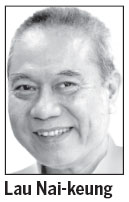The gap between public opinion and media opinion
Updated: 2013-01-15 05:49
By Lau Nai-keung(HK Edition)
|
|||||||||
Thousands of Christians staged a rally outside government headquarters last Saturday to demonstrate their opposition to proposed legislation that would outlaw discrimination against sexual minorities. Organizers claimed 50,000 people took part in the three-hour prayer-protest, but police said 5,000 people were there at the peak.
Interestingly, The Standard reported that "among them were Gigi Chao, who is openly gay, and her mother Kelly Yao Wei, a former actress" without further elaborations. Would it be possible that their reporter mixed things up with the other rally also at Tamar government headquarters with a hundred activists who support anti-discrimination laws?
While Secretary for Constitutional and Mainland Affairs Raymond Tam Chi-yuen said the government is open-minded about whether a public consultation should be commenced to consider a law against any discrimination on the grounds of sexual orientation, outnumbered gay groups declared they would not accept the Policy Address if it failed to address their demands.
If the dissidents' showdown on Jan 1 did not impress our Chief Executive, I am not sure why our gay friends would have better luck campaigning on sexual orientation matters now, with this hundred member strong alliance, but Raymond Tam told us that Leung will shed further light on the matter in the Policy Address. There is no pressing need.

I sincerely hope that CY can focus on more pressing issues, including housing, economic development and opportunities for our youth, and all the fuss about policies on homosexual matters is just one among plenty of other "trial balloons" which appear to have been sent up around town in the last couple of weeks.
For example we hear that help for the poor and the elderly will be key components of the Policy Address. According to welfare chief Matthew Cheung Kin-chung, among the initiatives for the poor and elderly will be a pilot voucher scheme to help the elderly pay for care services in the private sector. These 1,200 elderly people "who are moderately physically impaired" will remain hopeful, while others hoping for a cash handout or for the setting of standard working hours will have no hope at all.
Instead of piecemeal policies, CY Leung should focus more on providing us with a clear vision. A maiden Policy Address is as much about showing competence as it is about inspiring hopes for a better future. Leung therefore has to produce a comprehensive framework on issues like housing, poverty, education, health, environment, an ageing population and universal suffrage.
Right now, his stated commitment to provide more and better housing are not being felt by the general public, although ensuring sufficient land supplies was one key theme flagged by many media "sources". Property sentiment rebounded over the last week to levels in place before the introduction of anti-speculation measures. There were 153 new units and about 32 old flats snapped up. Most expect prices to rise due to the expected mild measures to be adopted in the Policy Address.
This brings us back to CY's recent claim that there is a gap between public opinion and media opinion. Conceptually I agree with his assessment, but perhaps we differ on the size of the gap. More importantly, I believe that the gap is getting smaller and converging towards the media's side.
I have no objection to his conducting private visits to the grassroots and posting to the blog only after the fact. It is also all right for him to listen more to his "fans". My only worry is that there weren't enough "trial balloons" around for public debate. A Policy Address is not your math homework where you can work out the correct answers alone at home. A successful Chief Executive not only has to provide us with good policies, he also has to let us believe that the policies that he is giving us are the best currently available, and then mobilize our support.
That's why consultation should have been a public process. It should have involved CY telling us the challenges facing Hong Kong, what proposed changes people are expecting, and his assessment of these proposals. At the end of the process are his vision and his answers to these problems. As all these stages are cut short, another opportunity for consolidating public opinion in preparation for the Policy Address is lost. "Test balloons" abound, but few are from the government. Media Opinion prevails.
The author is a member of the Commission on Strategic Development.
(HK Edition 01/15/2013 page3)